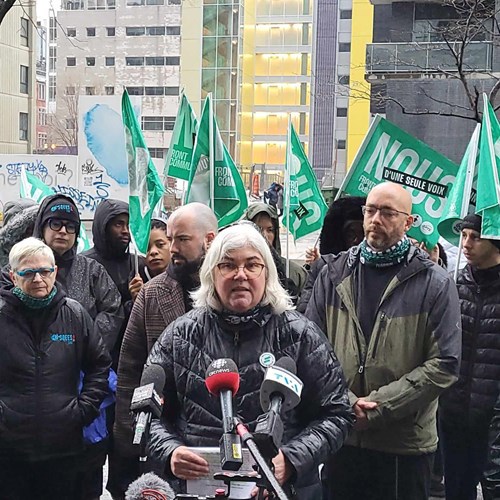Contract talks in health and social services | Workers have been stretched to the limit for too long
December 10, 2023

Montréal — In the middle of a series of seven consecutive strike days, Front commun unions representing workers in health and social services are sharply critical of the setbacks the government wants to impose in terms of working conditions. Constant repetition of words like flexibility and adaptability fails to conceal its goal of exerting greater control over the work carried out by exhausted workers in the public system.
After over a year of contract talks, and at a time when our public system is going through one of the worst crises in its history, the unions are surprised to see the government keep on proposing setbacks at sectoral tables. Its goal in attempting to reopen local matters is to ensure the possibility of moving employees between services and sites, as well as imposing schedules that would include several work shifts. And yet, what both Quebecers and workers are asking for is more stability in service delivery.
“Employees right now are leaving the system by every available exit,” said FSSS-CSN president Réjean Leclerc, FP-CSN first vice-president Jessica Goldschleger, APTS first vice-president Josée Fréchette, FSQ-CSQ president Isabelle Dumaine, SQEES-FTQ president Sylvie Nelson and Conseil provincial des affaires sociales (CPAS-CUPE Québec) president Maxime Ste-Marie. “By attacking what little stability is still provided by working conditions, the government is stepping on the gas and heading straight into the wall. It needs to do exactly the opposite. Working conditions for all of the job titles in the system need to be improved immediately. With a third series of strike days being held across Québec this weekend, workers are showing their determination to achieve better working conditions and to fight for better services for Quebecers.”
In the middle of contract talks, the government has also chosen to end overtime paid at twice the regular rate for all personnel, even though this was an important measure to retain employees. Since the beginning of sectoral talks, the government has put forward measures that are temporary or that are intended for a few job titles only. This is a long way from what’s needed to convince workers to stay in the public system and to attract new employees.
“Minister Dubé and Premier Legault should spend less time on low-level attacks against unions, and more time giving mandates to improve working conditions at the sectoral tables,” said the spokespersons. “Unions aren’t responsible for the fact that there aren’t enough people in many job titles, or that employees are at the end of their rope. The workers who are out on strike expect the government to do better.”

